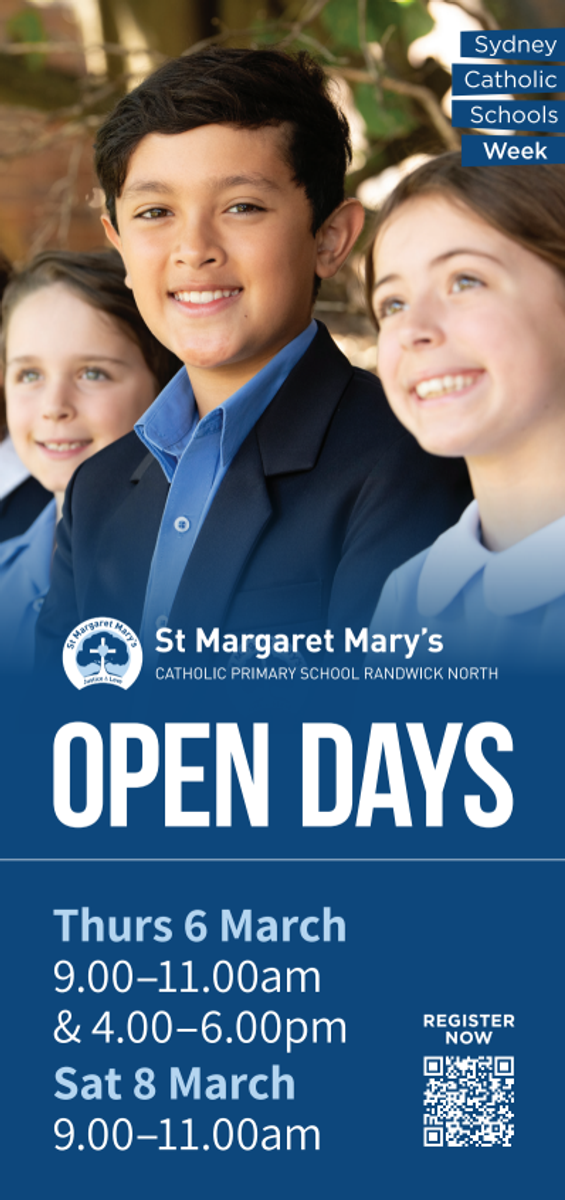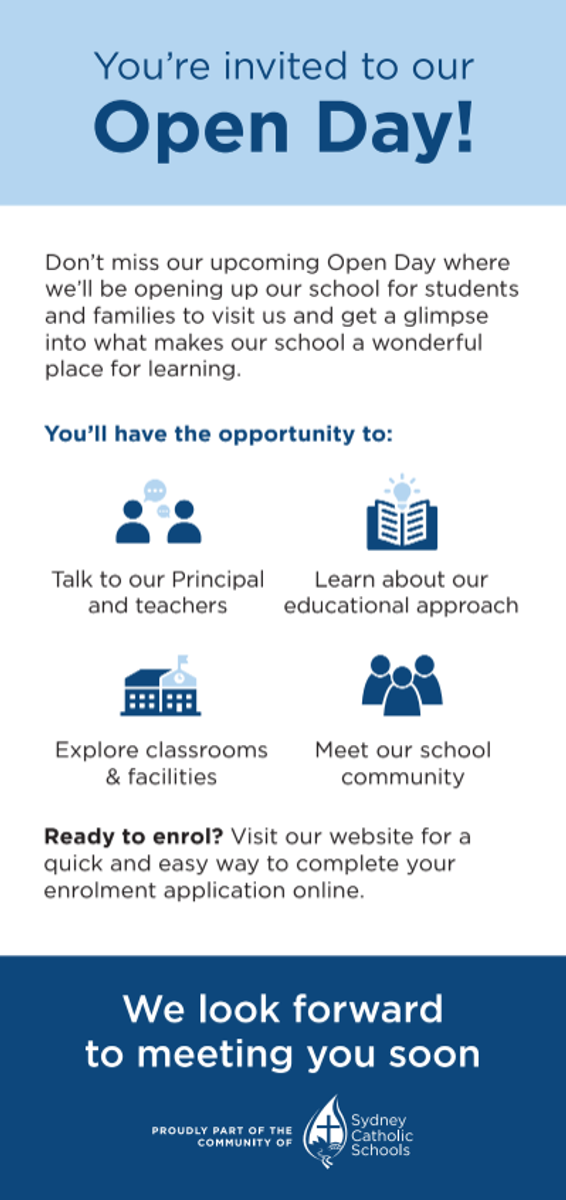Principal's Report
Kylie O'Donnell

Principal's Report
Kylie O'Donnell
Dear Parents and Carers,
This fortnight as we go about our busy lives, let’s take a moment to keep Pope Francis in our thoughts and prayers. He’s been in Rome’s Gemelli Hospital since 14th February, battling bilateral pneumonia. There’s been an outpouring of support from people all around the world, religious leaders, political figures, and faithful individuals, all sending their well wishes and prayers.
During this time, let’s join the global community in praying for his recovery, hoping he returns to full health soon. May his faith and dedication continue to inspire us all.
We’d love your help in promoting our Open Day Sessions next week. Opening the school to the community is a fantastic opportunity for prospective families to visit and get to know our school. Sessions will be held on Thursday, 9:00-11:00 am and 4:00-6:00 pm, as well as Saturday, 9:00-11:00 am. Your experiences and testimonials are the best form of advertising for St Margaret Mary’s, and we encourage you to share your positive thoughts with others. We’d also love for you to join us at any of the sessions, but especially on Thursday morning, when our classrooms will be open for you to see firsthand how our teachers and students are engaged in learning. It’s a wonderful chance to showcase our vibrant school community and all that we have to offer.






We are incredibly proud to share the efforts of Amelie Scully, Year 3, who made a significant impact during Term 4 of 2024 and the recent school holidays. Amelie volunteered her time with Kids Giving Back working alongside 1170 young changemakers to help prepare over 6500 meals, breakfast boxes, snack packs, and care packages for vulnerable communities across Sydney.
Amelie’s commitment to helping others exemplify the values of generosity and community spirit that we hold dear at St Margaret Mary’s. Amelie also took the time to write thoughtful, encouraging messages to be shared with those in need, spreading hope and kindness through her actions.
We are so proud of Amelie and the difference she has made, and we celebrate her as a shining example of compassion and service. Well done, Amelie!


Start building autonomy and self-reliance in your kids today by Michael Grose - Link to Article
I introduced you to Michael Grose, a well-known parenting expert in last fortnight’s newsletter. In this article he offers twelve practical strategies for building resilience and autonomy in our kids. Michael shares insightful, actionable tips to help you foster greater independence in your children equipping you with simple, yet effective language to use at home
1. “Never regularly do for a child the things a child can do for him or herself.”
Goal: Independence
Parenting-for-independence is a philosophy that guides many teachers and parents today.
In effect, this sentence means that we give children the skills and competencies to look after themselves physically and emotionally wherever possible.
Independence-building is easy to say, but hard to do. It requires patience, time, and teaching from parents. And a recognition that it may be easier to do things for kids in the short-term, but keeping them dependent on you does them no favours.
It’s a worthy guiding principle that leads to self-sufficiency in children and, ultimately, redundancy as parents.
2. “Is this something you can do?”
Goal: Self-help
Independence takes many forms, but the most common is the development of self-help skills.
The confidence, pride, and, for most, sheer pleasure that kids derive from doing the simple things for themselves, such as a toddler tying his shoelaces or making their lunch, is immeasurable.
Yet it is so quickly denied if you see it as a job to do everything for children.
Independence begins at home with the development of self-help skills.
3. “Have you checked the help roster today?”
Goal: Contribution
A great way to develop a sense of independence is to give kids opportunities to help at home.
There is no need to overburden children with jobs. A sensible allocation of chores according to their age and study requirements will help you immensely and provide fantastic training for them.
It also builds accountability, resilience and a work ethic, highly valued characteristics for continued success at school and later in life.
4. “Which of these two would you prefer?”
Goal: Decision-making
As wise leaders, parents need to call the shots on how they conduct family life and manage health and welfare issues, such as appropriate bed and bath times. Some things are not up for negotiation.
However, there are areas where parents can easily give children autonomy and say, ‘It’s your call!’
Give simple choices about suitable clothing, how to keep their bedroom, what they eat, and who they play with are the types of decisions they can make, with age appropriate guidance.
5. “How can you make this happen?”
Goal: Problem-solving
Kids get used to bringing their problems to parents to solve. If you keep solving them, they’ll keep bringing them.
A problem-solving approach relies on asking good questions, which can be challenging if you are used to solving your child’s problems.
When a child brings you a problem, the first question should be:
‘Can you handle this on your own?’
Next should be,
‘What do you want me to do to help you solve the problem?’
These questions are not meant to deter children from coming to you but to encourage them to start working through their concerns themselves.
6. “We rely on you to do this.”
Goal: Reliability
Reliability is closely connected to responsibility and other aspects of independence.
Every child over the age of five, at least, should do something that someone else relies on, whether it’s looking after a pet, clearing the meal table, or emptying the garbage regularly.
It can be challenging to have others rely on you. For example, they may inevitably forget to put out the rubbish bins on garbage night, which means your bin will overflow for the next week.
Kids inevitably won’t get things right, but that doesn’t mean we should stop giving them responsibilities. Neither should it mean we give responsibility to kids who are already responsible.
7. “What can you learn for next time?”
Goal: Self-sufficiency
Learning from mistakes is part of the independence-building process for children. Often, adult impatience or an unwillingness to tolerate errors prevents us from giving kids the chance to do things for themselves or take on real responsibilities.
If independence is to be a significant part of your family’s culture, then be willing to help kids learn from their mistakes, whether social, behavioural or messing up while helping out at home.
8. “How do you feel about this?”
Goal: Emotional intelligence
An often overlooked aspect of independence is the ability to self-manage your emotional state.
Emotional self-management starts with recognising your feelings about a particular event or action and then labelling those feelings.
If possible, prompt children to identify their emotions before they act on them.
You can also revisit events and ask children about the feelings that may have led to a specific behaviour, such as hurting or yelling at a sibling.
9. “When you muck up, you make up.”
Goal: Accountability
Kids of all ages make mistakes.
Mucking up is part of the learning process.
However, some kids will keep repeating their mistakes unless they face the consequences of their decisions.
Behavioural consequences teach children to take greater responsibility for their lives and make more intelligent choices.
Help kids make up for their mistakes when they impact others so that they will learn not to make the same mistakes again. This may involve an apology, restitution, or withdrawal of the right to use something or access a place.
10. “Do what’s right, not what’s easy.”
Goal: Integrity
Independence and integrity go hand-in-hand. Integrity is an essential leadership attribute and a high-level social skill.
Integrity means doing the right thing by others and has a language of its own.
Kids are often tempted to take the easy way out with many issues, such as:
Putting off homework because it’s too hot.
Accepting an invitation to a friend’s birthday party rather than going to a sibling’s special sporting event.
Neglecting to pack away toys at the end of the day.
Reminding kids to do the right thing may be tiring, but important messages should be repeated so that kids absorb them……and repeat them when they have their children!!
11. “How will you fix this?”
Goal: Restoring relationships
Independent kids are usually socially-smart kids who don’t operate in a bubble.
They know that their behaviour impacts others, and they are mindful of the thoughts, feelings, and behaviours of others. They also make amends or restore relationships when their behaviour negatively affects others.
Relationship restoration is a lifelong skill that involves swallowing your pride, making up, giving something back, not holding a grudge, and moving on.
12. “Let’s find a way to make this happen.”
Goal: Positive risk-taking
One way to develop independence is to help children safely navigate an ever-increasing environment outside their homes.
Ideas include:
Adults and children do things together, such as catching public transport until they are ready to go alone or with friends.
Give kids minor freedoms before giving them more considerable liberties. For instance, allow a young child to walk part of the way to school independently and extend the distance as their ability and confidence grow.
Finally……….
Independence-building is the quickest path to children’s competency, confidence, and creativity and a shortcut to resilience and authentic learning. Unfortunately, we’ve gradually retreated from this approach over recent generations, much to children’s detriment.
It’s time to help kids reclaim their independence.
The best place to start—or continue the process—is to incorporate the language of independence into family life.